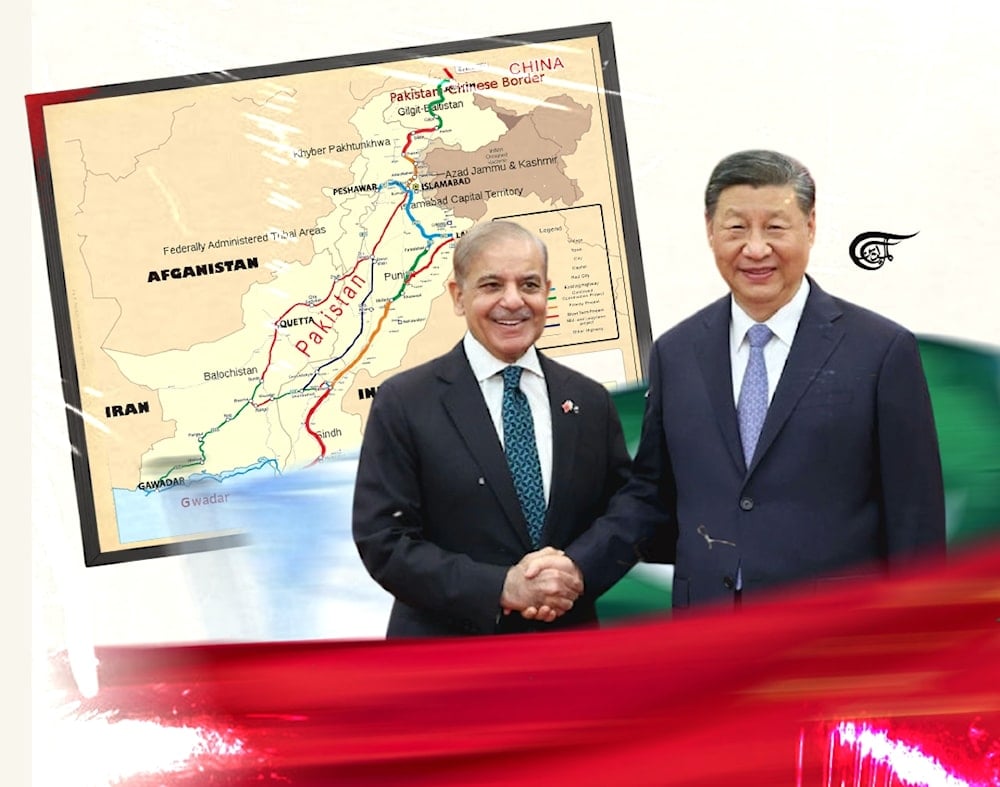The China-Pakistan Economic Corridor
The China-Pakistan Economic Corridor (CPEC) is anticipated to boost both the economies of China and Pakistan and to foster goodwill between the two nations.
-

The CPEC Master Plan through 2030 will shape Pakistan's economic future and could help the country restore its position as a significant Asian economic force. (Al Mayadeen English; Batoul Chamas)
The China-Pakistan Economic Corridor (CPEC) has been a framework for regional connectivity for nearly 10 years. This initiative will benefit not just China and Pakistan but also Afghanistan, Iran, India, and the Central Asian Republics. A tight relationship that goes beyond friendship, the China-Pakistan Economic Corridor (CPEC) is tied to the economic and social advantages of both nations.
The China-Pakistan Economic Corridor has completely transformed Pakistan. Since Pakistan's founding, unemployment has been a major issue. Every new government makes a pledge to end unemployment and advance society, but this has not always happened. In its 70-year history, Pakistan has alternatively emerged as one of Asia's most powerful economies and then weakened, lagging behind in the race for progress. The CPEC initiative, which is now helping Pakistan, has the potential to change the trajectory of events in the years to come.
The initial objective of the China-Pakistan Economic Corridor (CPEC) in the 1990s was to link the Arabian Sea with China's western regions. The first proposal was made in 1999. The development of Gwadar Port was completed at the beginning of the twenty-first century, and following 2010, numerous Memorandums of Understanding (MoUs) were signed.
On April 20, 2015, Chinese President Xi Jinping traveled to Pakistan, where the two countries agreed on a $26 billion CPEC project. At the time, this project was recognized as Pakistan's most significant endeavor.
Due to several internal and foreign crises that had a detrimental impact on its economic status, Pakistan was vulnerable internationally before the 21st century.
However, the CPEC project offered the region fresh optimism and gave Pakistan a new identity on a global scale. Longtime rival India has continuously opposed this project and attempted several strategies to thwart it, but India's plans have never succeeded. For regional growth, the China-Pakistan Economic Corridor is extremely important.
Regional connectivity, energy centers, logistics hubs, trade, peace and stability, cultural harmony, investment opportunities, industrial cooperation, financial collaboration, agricultural partnerships, tourism, education, human resources, healthcare, and people-to-people connections will all be improved by this project. Additionally, it will expand the prospects for livelihood, improve regional security and stability, and open the door to ending hunger and poverty.
CPEC 2.0, the second phase of CPEC, has started. While business-to-business ties are being fostered in the second phase, government-to-government links were created in the first. This phase involves the establishment of export-oriented industries in Pakistan's special economic zones. The Pakistani government wants to increase exports to the point where the nation is no longer experiencing a foreign exchange crisis, which will remove the need for recurrent IMF loans and build the groundwork for a stable and sustainable economy.
Internal and foreign dangers to this endeavor are also anticipated given the delicate nature of the situation. Attacks on CPEC have escalated since the Taliban took over Afghanistan. Several of these attacks have been attributed to the TTP, and Pakistan has confirmed on multiple occasions that attacks from Afghanistan have targeted and killed numerous Chinese workers. At first, there were rumors that these attacks were being carried out by the Afghan Taliban. The Afghan Taliban, meanwhile, have publicly acknowledged China as a friend and extended an invitation to China to invest in Afghanistan, demonstrating their lack of involvement in these events.
One of the most crucial components of the project is Gwadar Airport. The Pakistan Airport Authority claims that the 4,300-acre New Gwadar International Airport Project, which is well located close to Gurandani, is a centerpiece project of the China-Pakistan Economic Corridor (CPEC). Gwadar International Airport has opened for business. It can handle large aircraft like Boeing and Airbus thanks to its 3.6-kilometer runway. With a total area of 4,300 acres, it is the largest airport in Pakistan.
China has contributed $230 million to this project, which has won praise from all over the world and is considered to be one of the most significant components of CPEC. Soon, this airport will have easy access to international planes, enhancing Pakistan's standing internationally.
To present, 27 projects worth $19 billion have been completed under CPEC, and 63 projects worth over $35 billion are still in progress. According to a report by China Three Gorges South Asia Investment Ltd, seven of the completed projects focus on improving Pakistan's infrastructure, while 11 are in the energy industry. In addition to the three port projects at Gwadar, six welfare projects have been completed.
Pakistan aims to update road and rail infrastructure, establish new optical fiber networks, strengthen Gwadar and other ports, boost trade, finish four urban mass transit projects in important cities, and generate 17,045 MW of power through CPEC by 2030. Numerous corporate centers, medical facilities, and educational establishments are also planned. Some projects have already been completed, while others are still in the works.
The CPEC Master Plan through 2030 will shape Pakistan's economic future and could help the country restore its position as a significant Asian economic force. This project would not only revolutionize economic development but also provide the region with state-of-the-art infrastructure, significantly improving transportation and resolving other logistical challenges.
The China-Pakistan Economic Corridor (CPEC) is anticipated to boost both the economies of China and Pakistan and to foster goodwill between the two nations.

 Abdullah Ali Khan
Abdullah Ali Khan
 5 Min Read
5 Min Read







